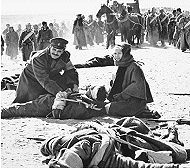Doctor Zhivago
by Bill Harry

|
Doctor Zhivago by Bill Harry  |
| The
Soviet authorities considered ‘Doctor Zhivago’ to be anti-Communist
and refused its publication in Russia. It first appeared in an Italian
edition in 1957 and on 23rd October 1958 it was officially awarded the
Nobel prize for literature. Pasternak was warned that if he flew to
Sweden to accept the prize he would never be allowed to return to Russia.
As he loved his country, the author remained in Moscow and never received
his prize. Olga was eventually released in 1953 following Stalin’s death.
In May 1960, two months after Pasternak’s own death, she was accused
of currency offences and sentenced to eight years in a Siberian camp.
She was released in 1964. The film adaptation of Pasternak’s book, directed by David Lean, was made purely with profit in mind and it went on to become the biggest film of 1965, despite adverse criticism. One reviewer wrote: “David Lean’s ‘Doctor Zhivago’ does for snow what ‘Lawrence of Arabia’ did for sand.” |
 |
 |
Critics
felt the film was a clumsy adaptation of the complex Nobel prize-winning
novel. Yet, in addition to an enviable clutch of Oscars, it made more
than $100 million within a few years and became one of the all-time
box office hits in cinema history. At the 1965 Academy Awards both ‘Doctor Zhivago’ and ‘The Sound of Music’ received ten nominations – and they finished neck-and-neck with five awards each. The film was heavily criticised, with reviewers claiming it was too long. Lean was so incensed that he vowed he would never make another film. However, he went on to make ‘Ryan’s Daughter’ in 1970 and ‘A Passage to India’ in 1984. |
| The
title role was played by Egyptian actor Omar Sharif, who many critics
believe was miscast. He was born Michael Shalhoub in Alexandria on 10th
April 1932 and was the number one male cinema attraction in Egypt between
1956 and 1961. Sharif, who had progressed to international stardom after
appearing in ‘Lawrence of Arabia’, for which he garnered an Oscar nomination,
heard that Lean was to film ‘Doctor Zhivago’ and requested that he be
given the part of Pasha/Strelnikov. He was surprised when Lean gave
him the role of Yuri Zhivago instead. It had previously been offered
to Peter O’Toole, who turned it down. Tom Courtenay played Pasha/ Strelnikov, a role based on Leon Trotsky. The female lead was Julie Christie, a British actress born in Assam, India on 14th April 1941. Despite rave reviews, she wasn’t nominated for Best Actress for ‘Zhivago’ but won that category the same year for her appearance in ‘Darling.’ Carlo Ponti had originally bought the rights to ‘Doctor Zhivago’ for his wife Sophia Loren to appear in as Lara Antipova, but Lean convinced him that Sophia was too tall. Sarah Miles had also been considered for the role but Robert Bolt, who penned the screenplay, said she was “a north country slut.” He was later to marry her and wrote the screenplay of ‘Ryan’s Daughter’ for her. |
 |
 |
 |